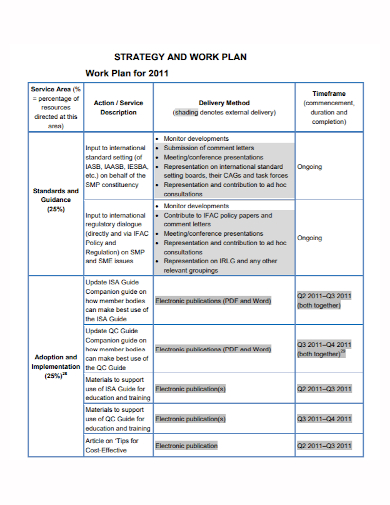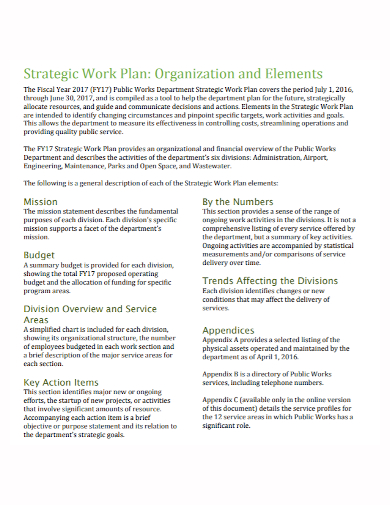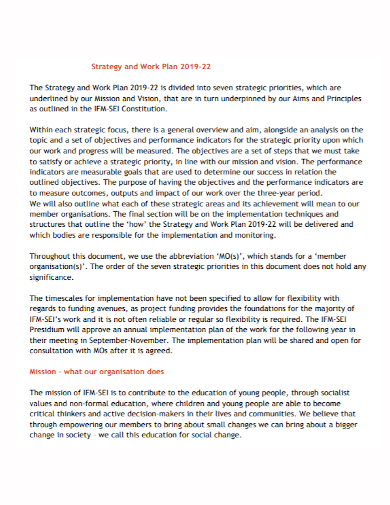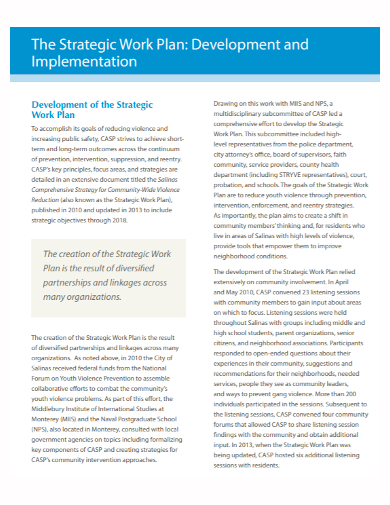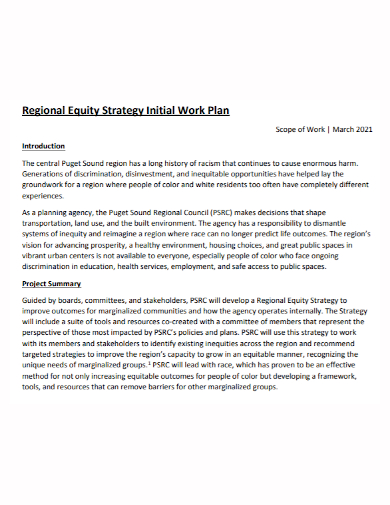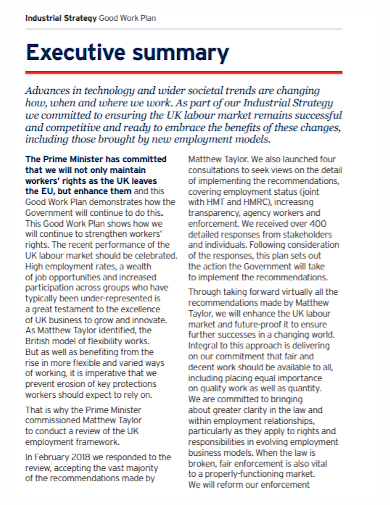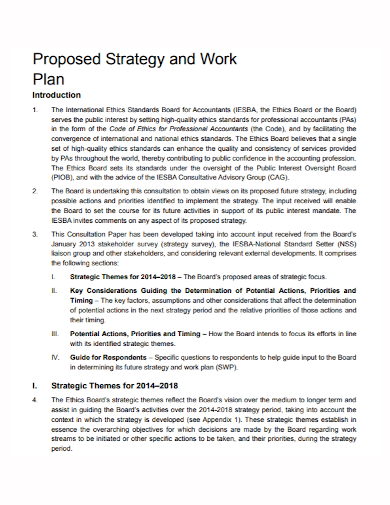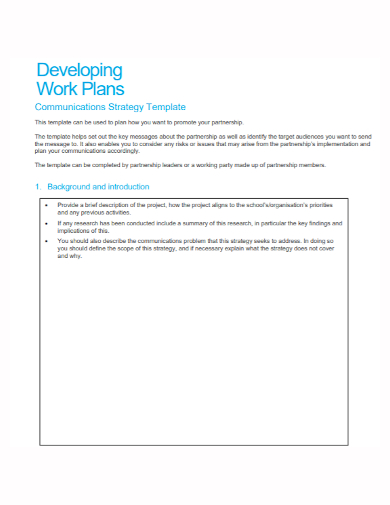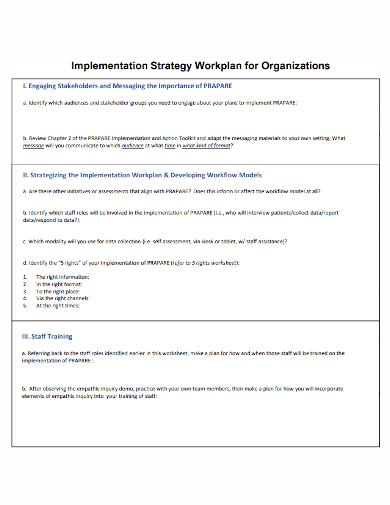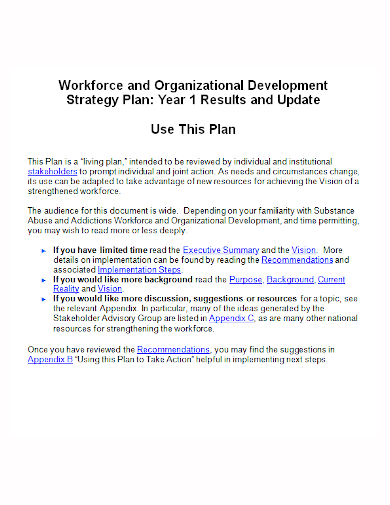You must plan how to achieve your objectives before you can achieve them. A work plan lays out a clear path to the goals and objectives you want to achieve. There will be resources, constraints, and other work management elements along the way, all of which must be described in your plan. Of course, no single person will write and initiate the work plan. It’s a project team’s action plan that will be presented to the board of relevant stakeholders for approval. When everything is said and done, you can move on to the rest of your work plan.
10+ Work Plan Strategy Samples
A project’s formal road map is represented by a work plan. It should clearly articulate the steps necessary to achieve a stated goal by establishing measurable objectives and deliverables that can be translated into concrete actions. An effective plan acts as a road map, allowing for the achievement of a goal through effective team collaboration. It’s helpful to define some relevant nomenclature before developing the methodology for creating an effective plan. The terms goals, strategy, objectives, and tactics are frequently used interchangeably. Each, however, has a distinct meaning.
1. Work Plan Strategy Template
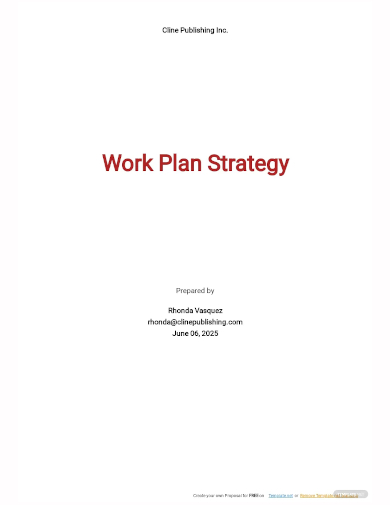
2. Work Plan Strategy
3. Organization Work Plan Strategy
4. Sample Work Plan Strategy
5. Work Plan Development Strategy
6. Strategy Initial Work Plan
7. Industrial Good Work Plan Strategy
8. Standard Work Plan Strategy
9. Work Plan Communication Strategy
10. Implementation Work Plan Strategy
11. Workforce Plan Strategy
How To Make a Work Plan
- Identify the project name, its objectives, and the timeline – Given the purpose of the project and the rest of the information you will fill in after this step, you can tell your project approvers that your task will take one quarter, six months, or one year. You should also explain the purpose of your project to your project approver. Will the goal of your project be to better meet the needs of your customers? Perhaps a competitor has released an improved version of a product you already have, and you need to scale up to keep up with market demand. Whatever your ultimate goal is, make sure you state it right away.
- Put the work plan into context – Write an introduction and background to better explain why this project is important to you and why you decided to pursue that ultimate goal in the first place. Putting the situation in context and defining the problem will help you explain why you require the solution.
- Establish goals and objectives – Your objectives may sound similar to your purpose, but they’re more specific and long-term in nature — for example, your team learned more about the process of releasing a bug fix or how to respond more directly to customer/market feedback.
- Coordinate resources – What percentage of the budget will be allocated to this project? What department will the funding come from? Who do you require for your team? Which software tools will be required to streamline the project (such as time tracking, team collaboration, and project management tools)?
- Understand constraints – Consider the three constraints of time, budget, and resources in particular. Because you’ve already listed all three in the previous steps, you can now consider the risks that could stymie those processes. Perhaps some of your team members take a few sick days during this time; perhaps unexpected tasks must be completed; perhaps some of your tools fail, necessitating additional funds from the budget. Whatever your constraints are, consider anything that feels like a risk of becoming a full-fledged constraint, which could affect the completion of deliverables or even the project’s goals and objectives.
- Talk about the risks and accountability – Risks must be evaluated from as many perspectives as possible. Take into account paid time off, accrued vacation time, and company holidays. Consider any unexpected events that could have a direct impact on your budget or timeline. Then appoint someone to be in charge in the event that the environment becomes conducive to those risks becoming a reality. To reduce the risk of error, create a sense of accountability among team members so that everyone has a measurable stake in the project’s success.
FAQs
What is a goal?
A goal expresses the mission concept and defines what you’re trying to accomplish. For example, a hypothetical goal might be to achieve world dominance, or something less ambitious, such as increasing the profitability of your company.
What tool can help you create a work plan?
Many project managers will use Gantt charts to organize their timeframes in a waterfall pattern at this point. Many project managers will use tools that can help them organize out tasks and deliverables in a simple task list if the project is small enough or if it makes sense.
What is strategy?
The broad strokes that will help achieve that goal are defined by strategy. Improving the efficiency of marketing dollars, for example, could be one strategy for increasing a company’s profitability. Another option is to cut costs or improve the product offering in order to expand the total addressable market.
The preliminary stages may include a meeting of key stakeholders and project sponsors before creating a detailed plan. The first step is to decide on a goal and some strategic options. This will aid in the creation of a broad general outline, the identification of some of the more important strategic considerations, and the definition of scope constraints. Individual strategies and tactics to support the key objectives are frequently identified through brainstorming.
Related Posts
FREE 7+ Fashion Business Plan Samples in PDF
FREE 10+ Sprint Planning Samples In MS Word | Google Docs | PDF
FREE 10+ Wedding Planning Samples in MS Word | Apple Pages | Powerpoint | PDF
FREE 9+ Monthly Study Planner Samples in PSD | Illustrator | InDesign | PDF
FREE 9+ Sample Curriculum Planning Templates in PDF | MS Word
FREE 10+ Teacher Development Plan Samples in MS Word | Google Docs | Apple Pages | PDF
FREE 10+ Basketball Practice Plan Samples in PDF
FREE 12+ School Business Plan Samples in PDF | MS Word | Apple Pages | Google Docs
FREE 7+ Client Strategic Plan Samples in PDF | MS Word
FREE 11+ Trucking Business Plan Templates in PDF | MS Word | Google Docs | Pages
FREE 7+ Small Hotel Business Plan Samples PDF | MS Word | Apple Pages | Google Docs
FREE 14+ Bakery Business Plans in MS Word | PDF | Google Docs | Pages
FREE 4+ Yearly Lesson Plan Samples in PDF
FREE 50+ Strategic Planning Samples in Google Docs | Pages | PDF | MS Word
FREE 10+ Construction Project Plan Samples in MS Word | Google Docs | Apple Pages | PDF

